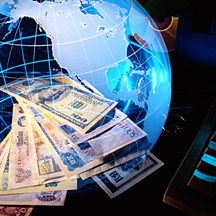
Hollande About to Wreck France?
• Mike "Mish" Shedlock The Daily BellHollande About to Wreck France With Economically Insane Proposal: "Make Layoffs So Expensive For Companies That It's Not Worth It"
ON AIR NOW
Click to Play


Hollande About to Wreck France With Economically Insane Proposal: "Make Layoffs So Expensive For Companies That It's Not Worth It"

This is how it works. When markets are up, people find positive stories to talk about. When markets are down, people focus on the negative.

Global economic crisis

Spain faces supervision by international lenders after a bailout for its banks agreed, EU and German officials said, contradicting Prime Minister Mariano Rajoy who had insisted the cash came without such strings.

After coming under heavy criticism for pursuing so called “integration” with totalitarian-minded rulers in Latin America, the governments of Chile, Peru, Mexico, and Colombia — announced the formation of a new regional body known as the Pacific Allia

Talk about inflation. Have you seen the price of bailouts lately? It wasn't that long ago that €100 billion, or $125B, would buy you a month or two of goodwill. Nowadays, a bank-bolstering plan of this size can hold the attackers at bay for only a ma

Good morning. Here's what you need to know.

Europe’s economies have been on a fiscal collision course for years, what with more people taking from the various socialist systems around the continent than paying into them.

The state visit to China this week by Russian President Vladimir Putin, followed by a summit of the Shanghai Cooperation Organisation in Beijing, has underscored a developing strategic partnership between China and Russia.

Depositors withdrew a total of about $100 million per day over the last month in a safe-haven bid fueled by uncertainty over policies that might be adopted as pressure grows to keep U.S. currency in the country.

This week's cartoons show two crises that continue to get worse despite outside efforts to help.

We upgraded the Republic of Ecuador to 'B/B' from 'B-/C' on sustained higher levels of investment that indicate improved growth prospects and higher levels of government revenues.

For those that are busy preparing for the coming global financial collapse, there is a lot to be learned from the economic depression that is happening right now in Greece.

While the Spanish government was able to sell all the bonds it wanted to, it mostly sold to the usual buyers: Spain’s increasingly fragile banks. As Madrid tries to come up with the money to bail out its banks, its main lenders are increasingly beco

The G7 is correct to be concerned.

The sky is falling, the Earth is dying, the money supply is shutting down.

One of the great absurdities of our modern financial system is that a nation living within its means, i.e. spending less than what it confiscates in tax revenue, is no longer the norm.

An International Monetary Fund report on Spanish banks will show the country's troubled lenders need a cash injection of at least 40 billion euros ($50 billion), sources in the financial sector said Thursday.

Chancellor Angela Merkel said Europe was ready to act to ensure stability in the euro zone as Spain's credit rating was cut by three notches on Thursday amid expectations it may soon seek EU help for banks beset by bad debts.

It’s not often economists will admit to bafflement, especially on a matter of utmost importance to national economic health. As the predominant measure of standard of living, productivity of labour in Canada, has fallen notoriously short

a great loss

Here’s an unusual duo for this version of bull versus super bull.

I talked with a Swiss banker from Geneva today. The conversation went like this:

Tourism, Greece’s second largest industry after the shipping industry, and already in a downdraft, is taking another hit as tour bus drivers will go on strike for four days next week; wage negotiations have deadlocked.

The European Central Bank will make a highly anticipated monetary policy decision tomorrow, gaining the most attention of any such meeting since December.

The Fed and the ECB take a lot of lumps, but the world's worst central bank might be the Bank of Japan.

Investors hoping to avoid the turmoil of the euro crisis have been pouring their money into German bunds and assets, expecting nothing but a safe place to store their money.

The European Central Bank left its main interest rate unchanged Wednesday, choosing to put the onus on political leaders to address an increasingly dangerous level of tension in the euro zone.

Only three small euro-zone countries have resorted to international bailouts and the hard conditions that come with them, and Spain, the currency union’s fourth-largest economy, is desperate to avoid becoming by far the largest casualty.

The worst is yet to come